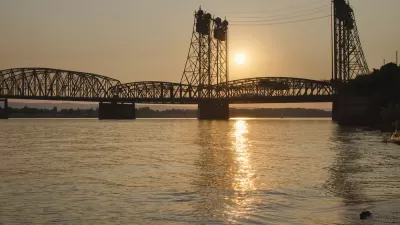The Oregon Legislature adjourned this week with no actions regarding the Columbia River Crossing—a controversial project with opponents on either side of the aisle.
“The Oregon Department of Transportation announced Friday it is closing the I-5 bridge project's offices, issuing cease-work orders to its many contractors and shutting the project down entirely by May 31,” writes Jeff Manning.
“The end comes after more than a decade of work and nearly $190 million worth of planning, engineering, financial and traffic forecasting and other work.”
An unlikely coalition of political interests opposed the project, according to Manning: “The project’s demise is an enormous victory for both environmental and urban planning groups from the left and conservative fiscal hawks from the right. This Green Tea Party, as they came to call themselves, attacked the project as a wasteful, bloated plan that was financially imprudent and promoted sprawl.”
In a separate article on the Seattle Transit Blog, Frank Chiachiere argues that recent highway projects have taken on too much complexity: “In an effort to mollify an ever-growing list of stakeholders, planners keep adding features – lanes, off-ramps, lids, walls – until the project gets too expensive and collapses (metaphorically speaking) like a Christmas tree with too many ornaments.”
FULL STORY: Columbia River Crossing: ODOT to pull plug, bridge project is dead

Alabama: Trump Terminates Settlements for Black Communities Harmed By Raw Sewage
Trump deemed the landmark civil rights agreement “illegal DEI and environmental justice policy.”

Study: Maui’s Plan to Convert Vacation Rentals to Long-Term Housing Could Cause Nearly $1 Billion Economic Loss
The plan would reduce visitor accommodation by 25% resulting in 1,900 jobs lost.

Planetizen Federal Action Tracker
A weekly monitor of how Trump’s orders and actions are impacting planners and planning in America.

Wind Energy on the Rise Despite Federal Policy Reversal
The Trump administration is revoking federal support for renewable energy, but demand for new projects continues unabated.

Passengers Flock to Caltrain After Electrification
The new electric trains are running faster and more reliably, leading to strong ridership growth on the Bay Area rail system.

Texas Churches Rally Behind ‘Yes in God’s Back Yard’ Legislation
Religious leaders want the state to reduce zoning regulations to streamline leasing church-owned land to housing developers.
Urban Design for Planners 1: Software Tools
This six-course series explores essential urban design concepts using open source software and equips planners with the tools they need to participate fully in the urban design process.
Planning for Universal Design
Learn the tools for implementing Universal Design in planning regulations.
Caltrans
Smith Gee Studio
Institute for Housing and Urban Development Studies (IHS)
City of Grandview
Harvard GSD Executive Education
Toledo-Lucas County Plan Commissions
Salt Lake City
NYU Wagner Graduate School of Public Service




























